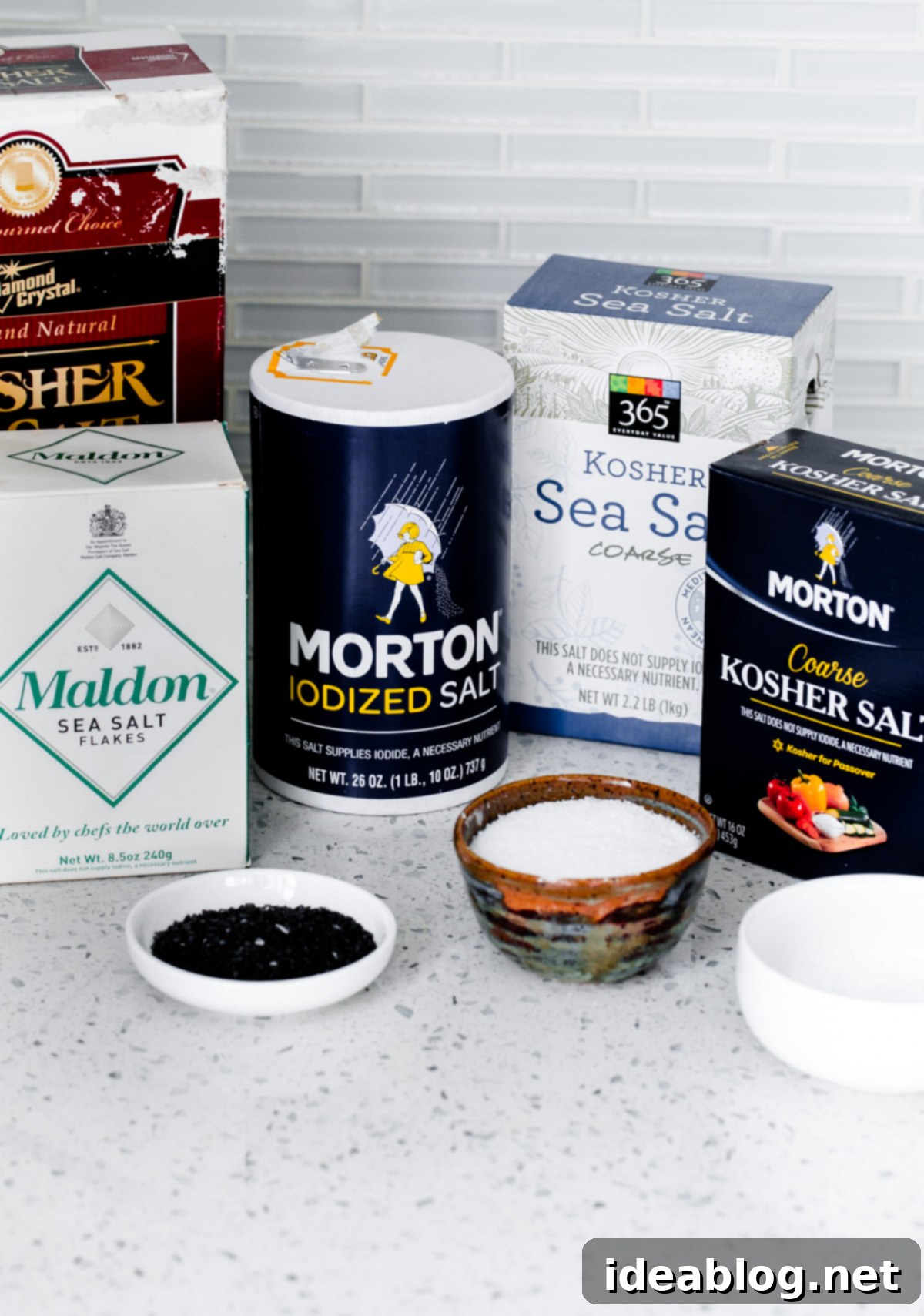Mastering Your Kitchen: The Essential Guide to Cooking Salts, Types, and Why Brand Matters for Perfect Seasoning
Embarking on a culinary journey often means delving deeper than just following recipes. It involves understanding the fundamental building blocks of flavor, and arguably, no ingredient is more crucial or misunderstood than salt. For years, I’ve channeled my inner cooking enthusiast, eager to explore the nuances that elevate everyday cooking into something extraordinary. Today, we’re taking a deep dive into the fascinating world of cooking salts – a topic so fundamental, yet so often overlooked in the culinary landscape.
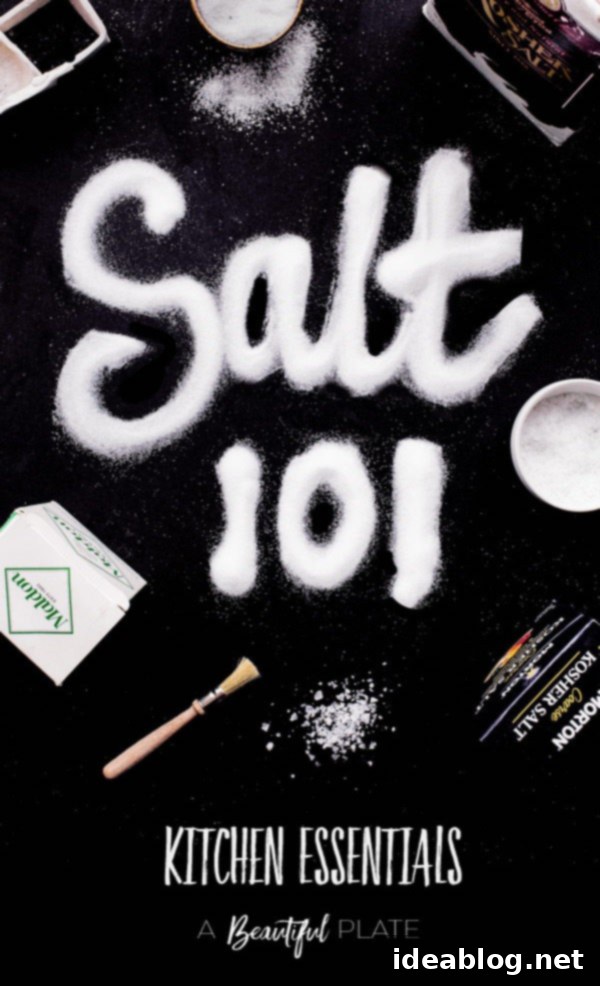
My passion for cooking extends beyond creating delicious dishes; it’s about empowering home cooks with the knowledge to truly master their kitchens. Remembering the incredible reception my list of essential cooking books received, it solidified my belief that there’s a real hunger for deeper culinary insights. As someone who has studied this extensively in culinary school and absolutely loves learning about it, I’m committed to making this website a comprehensive resource for both recipes and essential cooking techniques. This is precisely why we’re tackling a somewhat technical but immensely valuable subject today.
If you’re truly passionate about cooking, the insights you gain from this post will fundamentally change how you approach seasoning. It’s a game-changer, one that I honestly wish I had emphasized years ago. Why? Because salt isn’t just an ingredient; it’s the single most important ingredient in your kitchen pantry. Learning to properly season your food is perhaps the most powerful cooking skill you can acquire. It transforms dishes from bland to brilliant, balancing flavors and enhancing natural ingredients in ways no other seasoning can.
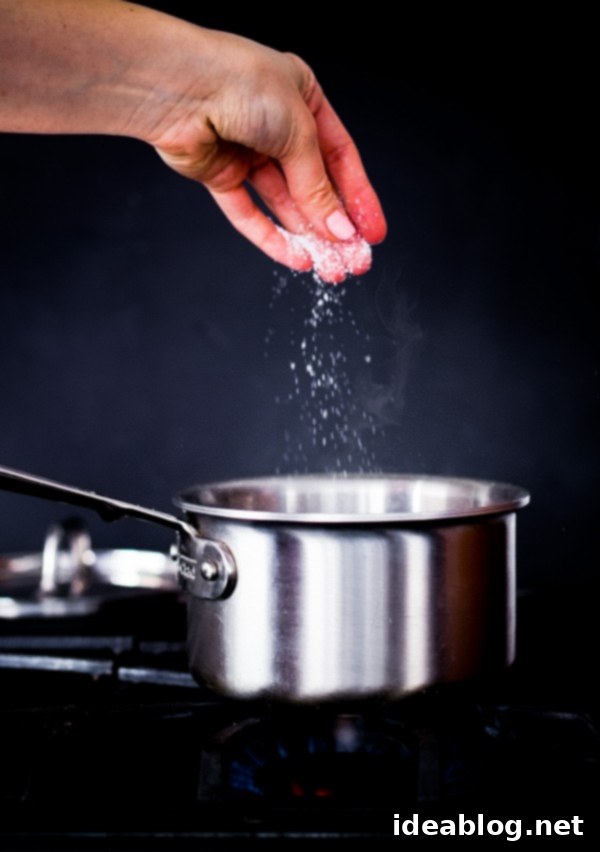
The Hidden Secret of Salt: Why Type and Brand Matter So Much
Have you ever found yourself standing in the grocery aisle, feeling utterly bewildered by the vast array of salts available? From fine table salt to coarse kosher salt, delicate sea salt flakes to robust Himalayan pink salt – the choices can be overwhelming. And perhaps you’ve pondered why some recipes specifically call for “kosher salt” or “sea salt,” while others simply state “salt.” It’s a common confusion, and I’m here to clarify it. The truth is, understanding salt goes far beyond its basic savory flavor.
Here’s the quick, crucial takeaway:
Not all salts are created equal, and they are certainly not interchangeable. More importantly, the specific brand and variety of salt you choose to buy and use will profoundly affect every single dish you prepare. Yes, every single recipe, without exception.
This might sound like an exaggeration, but consider this scenario: If you’re diligently following a recipe that specifies “1/4 teaspoon of salt” (or, even worse, “1/4 teaspoon of ___ salt” without specifying the type or brand), you could unknowingly be adding anywhere from two to four, or even six times the intended quantity of salt! This drastic difference can lead to a severely under-seasoned or, more likely, an unpleasantly over-salted dish. The impact on your food’s flavor and texture is immense.
How is such a significant discrepancy possible? The answer lies in a little-known but critically important fact: every type of salt, and even more surprisingly, every brand of salt, varies dramatically in its density. The physical structure of salt crystals — their size, shape, and how they pack together — directly influences how much salt fits into a given volume, such as a teaspoon.
This phenomenon is truly remarkable and absolutely worth discussing, especially on a website dedicated to the art of food. It’s one of those essential cooking secrets that many home cooks never learn, yet it holds the key to consistently delicious results. The following chart beautifully illustrates this concept:
Understanding Salt Density: A Comparison by Brand and Type
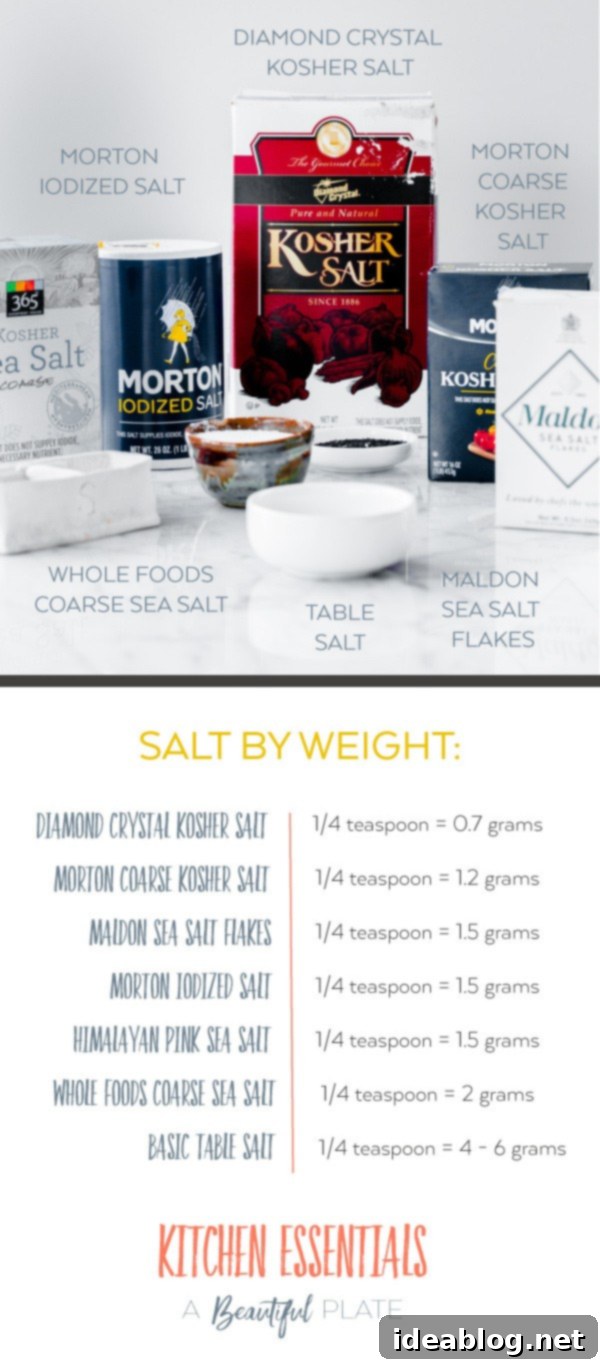
Most home cooks are somewhat aware that different types of salts can taste more or less “salty” than others. For example, table salt, with its fine, dense crystals, often seems overwhelmingly salty (a personal confession: I genuinely dislike using it for most cooking). We instinctively know that substituting a quarter teaspoon of sea salt for a quarter teaspoon of kosher salt won’t yield identical results. This intuition is correct, and it all boils down to density.
However, if you take a moment to closely examine the density chart above – which I strongly encourage you to do – you’ll uncover an even more profound insight. The density of the *same type of salt* can vary dramatically *by brand*. This distinction is often overlooked but has a monumental impact on your cooking accuracy.
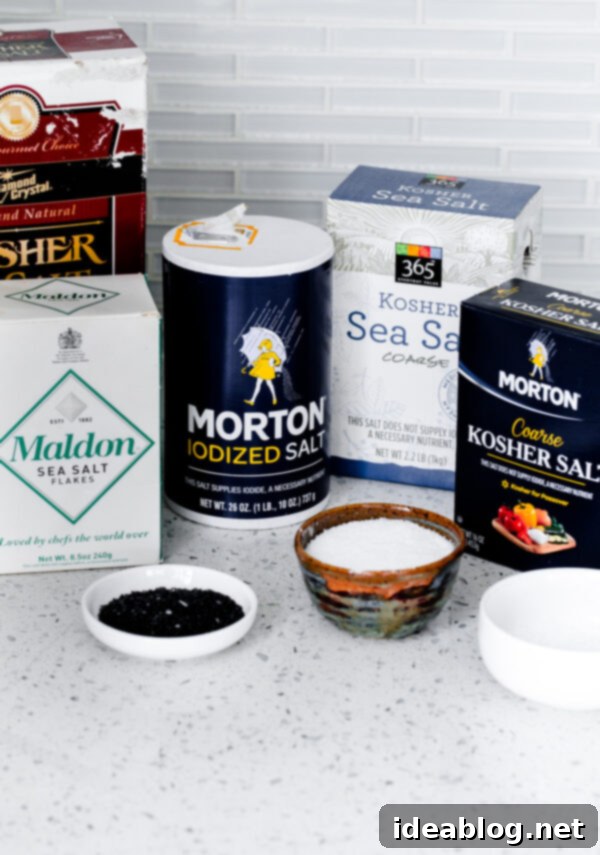
A prime example of this brand-specific density difference is found in kosher salt, one of the most popular choices for professional and home kitchens alike. The two leading brands are Diamond Crystal Kosher Salt and Morton Coarse Kosher Salt.
Consider this: 1/4 teaspoon of Diamond Crystal Kosher Salt weighs approximately 0.7 grams. In stark contrast, 1/4 teaspoon of Morton Coarse Kosher Salt weighs 1.2 grams. This means Morton’s is nearly twice as dense as Diamond Crystal. To add another layer of complexity, 1/4 teaspoon of Whole Foods Kosher Coarse Sea Salt can weigh up to 2 grams. That’s a truly huge difference!
The practical implication is significant: if you’re following a recipe that simply calls for “kosher salt” without specifying a brand or weight (which, let’s be honest, most recipes do not), you could easily end up with a dish that’s either severely under-seasoned or, worse, unpalatably over-seasoned. This is precisely why, if you look at almost any savory recipe on this site, you’ll notice that I generally do *not* list specific salt quantities unless it is absolutely critical for a chemical reaction or specific outcome. I actively avoid it because the potential for misjudgment makes me nervous.
My Go-To Salt Recommendation: Diamond Crystal Kosher Salt
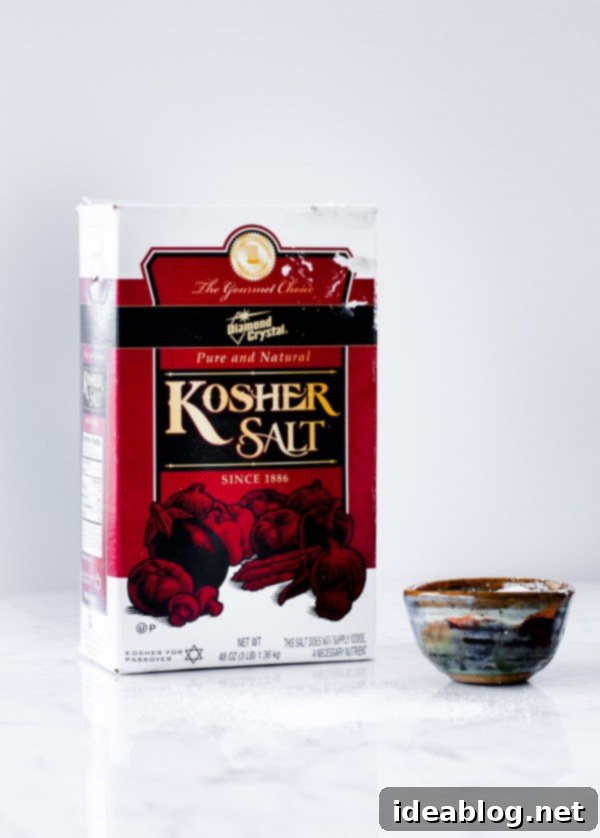
Given these crucial differences, my unequivocal favorite and highly recommended cooking salt is Diamond Crystal Kosher Salt. Based on my personal experience and observation, it is the brand predominantly used in most professional kitchens and restaurants. Its reliability and consistency make it an indispensable tool for any serious cook.
It comes in a convenient 3-lb box and lasts for a considerable amount of time, making it an economical choice for consistent, quality seasoning. For finishing dishes, where texture and visual appeal are paramount, I often turn to popular flaked finishing salts like Maldon sea salt flakes or Fleur de Sel, which offer a delightful crunch and burst of flavor.
Why I Love Diamond Crystal Kosher Salt:
- Effortless Pinching: Its unique crystal structure makes it incredibly easy to pick up and pinch between your fingers. I keep a small bowl of it right by my stove, and this is the only method I use for seasoning almost everything. I strongly advocate for ditching salt shakers or grinders for everyday cooking. Using your fingers allows for far greater control, enabling you to adjust seasoning precisely as you cook and taste. This tactile connection to your food is invaluable.
- Superior Dissolvability and Even Distribution: Diamond Crystal Kosher Salt dissolves exceptionally well into food, sprinkles evenly over surfaces, and adheres nicely to various ingredients. Its delicate structure also means you can easily ‘grind’ it even finer with your fingertips for even quicker dissolution if needed. For cooking, fast-dissolving salts are ideal. For finishing, you might seek salts that dissolve less readily, like Maldon sea salt flakes or Fleur de Sel, to provide textural contrast. However, I frequently use Diamond Crystal Kosher Salt for finishing applications too, particularly when a subtle texture and even distribution are desired.
- Pure and Natural Flavor: This salt is natural, free from anti-caking agents or other additives often found in table salt. Its pure flavor allows the natural tastes of your ingredients to shine through, without any metallic or off-notes.
- Lowest Density: Crucially, Diamond Crystal is the least dense variety of kosher salt available. This is my preference because it significantly reduces the risk of over-salting. An extra pinch or two, while perhaps not perfectly precise, is far less likely to ruin a dish compared to an equal volume of a denser salt. It provides a greater margin for error, which is incredibly helpful when you’re seasoning by feel.
While this post is by no means a sole endorsement of one brand, I genuinely encourage you to seek out and try Diamond Crystal Kosher Salt and experience the difference for yourself. If it’s not readily available or you prefer to use a different brand, the key is to always adjust the quantity of salt to compensate for its density, or, even better, learn to season by taste rather than strict measurements.
An Important Note on Iodine in Salt:
Iodine is an essential dietary requirement, crucial for thyroid function. Historically, table salt was iodized to combat widespread iodine deficiency. However, in modern diets, most individuals consume other iodine-rich foods or take multivitamins containing iodine, meaning they may not necessarily *need* to use iodized salt for cooking (please consult your medical professional for personalized dietary advice).
It’s important to note that kosher salt typically does not contain iodine. If you prefer or medically need to use iodized salt, please be aware that it can impart a slightly different taste (some describe it as metallic) and, due to its higher density, you will need to adjust (substantially reduce) the quantities called for in most recipes to prevent over-salting.
Developing Your Salt Intuition: The Art of Seasoning
I cannot stress enough the importance of consistently using one primary type of salt for the majority of your cooking and seasoning needs. If you constantly switch between sea salt, kosher salt, or table salt, you will find it incredibly difficult to develop the crucial intuition that comes from using a single salt over and over again. Through consistent use, I’ve become so intimately familiar with the relative “saltiness” and handling characteristics of Diamond Crystal kosher salt that I intuitively know how much I need to achieve proper seasoning in a dish without relying on measuring spoons.
Think of seasoning as learning to ride a bicycle. In the beginning, it requires conscious effort, perhaps a few wobbles, and a lot of practice. But with consistent effort, it eventually becomes second nature. Your hands learn the feel, your eyes gauge the amount, and your palate guides the process. The same applies to salt. Practice, taste, adjust, and soon, you’ll be seasoning with confidence and precision, elevating every meal you create.
